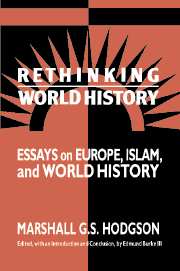Book contents
- Frontmatter
- Contents
- Editor's preface
- Introduction: Marshall G. S. Hodgson and world history
- Part I Europe in a global context
- Part II Islam in a global context
- 7 The role of Islam in world history
- 8 Cultural patterning in Islamdom and the Occident
- 9 The unity of later Islamic history
- 10 Modernity and the Islamic heritage
- Part III The discipline of world history
- Conclusion: Islamic history as world history: Marshall G.S. Hodgson and The Venture of Islam
8 - Cultural patterning in Islamdom and the Occident
Published online by Cambridge University Press: 18 December 2009
- Frontmatter
- Contents
- Editor's preface
- Introduction: Marshall G. S. Hodgson and world history
- Part I Europe in a global context
- Part II Islam in a global context
- 7 The role of Islam in world history
- 8 Cultural patterning in Islamdom and the Occident
- 9 The unity of later Islamic history
- 10 Modernity and the Islamic heritage
- Part III The discipline of world history
- Conclusion: Islamic history as world history: Marshall G.S. Hodgson and The Venture of Islam
Summary
For Western readers, Islamicate institutions can be specially illuminated by a comparison with Occidental institutions of the same period, as well as by consideration of what the Occidentals found to learn or borrow from the Muslims. Such a comparison can suggest assessments of potentialities in the two cultural sets as well as suggest long-term directions of movement in them, which may help us understand why this or that seeming possibility was not taken into account at this or that juncture. But at this point in our studies, it is hard to sort out the properly ecological circumstances from the expressly cultural commitments that enter into such comparison. It is perhaps even harder to sort out the cultural commitments that have contributed to social patterns in particular ethnic groups – local ruling classes, relatively compact nations like Egypt, and even whole language blocs like the Iranians. Inevitably, many comparisons have been attempted by scholars as if such elements could be sorted out. Perhaps the most important function of such a comparison as we can attempt is to suggest an alternative viewpoint to complement and perhaps correct the various current comparisons, usually superficial and often invidious or self-congratulatory on one side or the other.
The Earlier Middle Period, particularly the twelfth and thirteenth centuries, roughly equivalent to High Medieval times in the Occident, is the first period during which a comparison of the Occident with Islamdom can be particularly fruitful; up till that time, the Occident had been, on the whole, too backward to compare with one of the major centers of civilization.
- Type
- Chapter
- Information
- Rethinking World HistoryEssays on Europe, Islam and World History, pp. 126 - 170Publisher: Cambridge University PressPrint publication year: 1993



